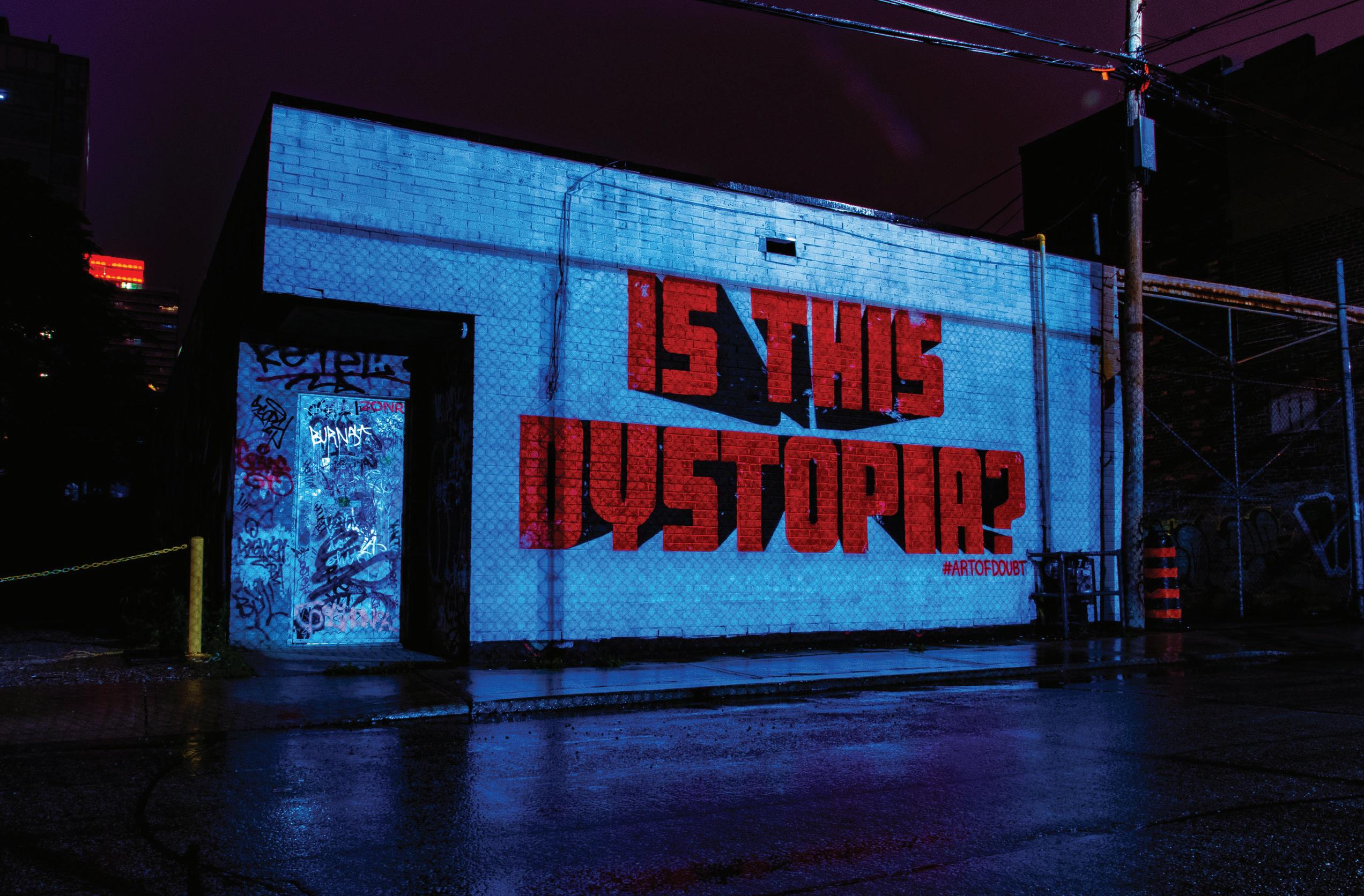
4 minute read
Leopold P. Mureithi
FROM DYSTOPIAN TO HUMAN FUTURES: A THREAD TRUNCATED
By Leopold P. Mureithi
Co-Chair, The Millennium Project Kenya Node
CONTENT analysis of six books recently received in the Review Room reveals a core message of moving from dystopia to a more human future. A long outstanding futurist, Richard Slaughter, notes in his book Deleting Dystopia: Reasserting Human Priorities in the Age of Surveillance Capitalism that “innovations initially regarded…as liberating and helpful have become absorbed into an oppressive global system….more dangerous and invasive with each passing year….the tendency toward unliveable dystopian futures is becoming unavoidable” (pp 1-2). Surveillance capitalism (SC) is a “mutant form of capitalism that unilaterally claims human experience as free raw material.” (p. 200).
To counter this technological dystopia, he prescribes deleting dystopia by which he means “not about working to eliminate a powerful idea but, rather, getting behind those human and social forces that collectively move us away from its realisation as a radically diminished condition of human life” (p. 192); this by promoting “human and cultural development” (p. 198).
Fortunately, William Halal records a megatrend towards human consciousness that could drive humanity away from possible technological dystopia. In Beyond Knowledge: How Technology is Driving an Age of Consciousness, Halal looks at macrohistory and sees a life cycle of evolution (LCE). Though he does not explain why this is a “cycle”, he notices an acceleration: “Roughly four million years were needed to found Agrarian Civilizations. Nine thousand years to invent Industrial Society. One hundred years for the Post-Industrial Era. Five decades to a Knowledge Age. And the past 20 years to an Age of Consciousness….the inner terrain in which we live our lives….awareness, mood and understanding” (p. 30). This consciousness revolution is likely to lead to “a tangible, productive and more meaningful way of life” (p. 34). This future is already evolving at present. Like William Ford Gibson wrote in The Economist of 4 December 2003, “the future is already here -- it’s just not evenly distributed.”
The simplest definition of the future is “any time from now;” and the past is “time gone.” Since this means that the “present” is a fleeting moment, one must agree with Theo Priestley and Bronwyn Williams that they captured the reality in titling their book The Future Starts Now. The sub-title Expert Insights into the Future of Business, Technology and Society reflects aspects of applications compatible with avoidance of dystopia and the reification of human-agency consciousness.
While “The future is right around the corner” (Jarod Kintz), the Issue of the time scale to consider remains. To Priestly and Williams, it is simply the question of the relevant planning horizon: “whatever time horizon we are looking towards” (p. 161). In addition to this freedom of choice of time frame, critical to delineating the time perspective is the interplay between uncertainly and plausibility – being “long enough;” not strictly calendar dependent, and never ignoring the near-term because sometimes “the advanced civilization that we should really worry about is one that is just 15 minutes ahead….[not light years in the future]” (Woody Allen). According to Jim Dator’s First Law, “one of the main tasks of futures studies is to identify and examine the major alternative futures that exist at any given time and place” (emphasis added).
Recall Halal’s Beyond Knowledge: “the great challenge now is, how to shape a workable global Consciousness….to become a mature civilization” (pp. 32-33, emphasis added). That “how” is dealt with by Claire Nelson’s SMART Futures for a Flourishing World: A Paradigm Shift
for Achieving Global Sustainability. She creates the term “SMART as a mnemonic for the principles: n S = sustainable systems n M = moral metrics n A = anticipatory agency n R = robust resilience n T = transformational technology” (p. 90).
Applied properly, “The SMART Futures framework is a process that can help shape that mindset….reinforcing approaches to ‘complex systems solutioneering’….the basic construct for the global future of flourishing we want to co-create….Everywhere. Every time. Everyone”(pp. 95-96). This is well put.
Milton Freedman stated that “only a crisis – actual or perceived – produces real change. When that crisis occurs, the actions that are taken depend on the ideas that are lying around” Yet, Robert Einstein warned that a problem cannot be solved by the same ideas that created it.” Thus, new ideas are necessary. Claire Nelson’s treatise contains plenty of those. So does Aftershocks and Opportunities 2: Navigating the Next Horizon. Edited by Rohit Talwar, Steve Wells, and Alexandra Whittington, the book contains 40 chapters by 37 authors from 16 countries on five 5 continents. The perspectives, ideas and creative solutions offered are a treasure trove.
Come to think of it, ideas and possible solutions to human problems are not the major constraints. This sobriquet is earned by deficient implementation which is underpinned by poor leadership. The role of leadership is the focus of be volume edited by Thomas Mengel and titled Leadership for the Future: Lessons from the Past, Current Approaches, and Insights from Futures Studies and Foresight. Many leaders do not walk their talk, even in enforcing the laws they make.
In eulogizing Richard Lamm of Colorado, Jim Dator’s email of August 2021 to WFSF members noted that “he and I talked about the futures, and…I was quite impressed. And depressed that there were so few like him then, and, it seems, even fewer now.” To this Reuben Nelson added that “he was outstanding…. for public service, not personal gain.” William Halal agreed that “Richard was an unusual politician who fearlessly proposed progressive policies….and… said what other politicians were afraid to touch. He is the kind of man who is badly needed today.”
The dearth of such leaders should be “no reason to quit the struggle” (Reuben Nelson). On the contrary, the futurist community should “help create the societal contexts in which persons such as Richard would offer themselves up for public service.” Point to ponder.










